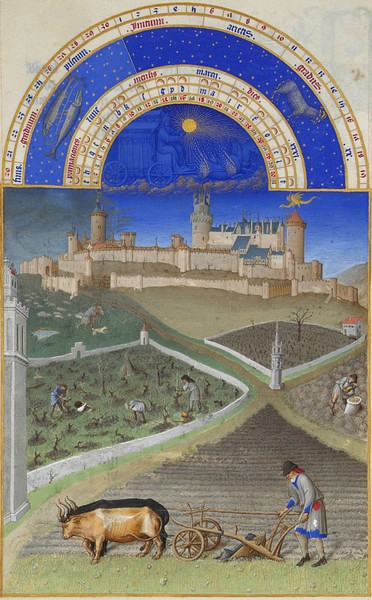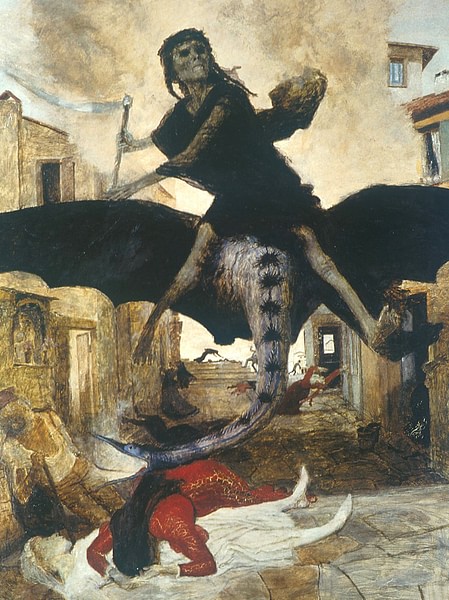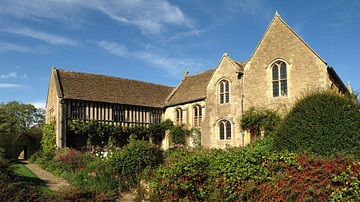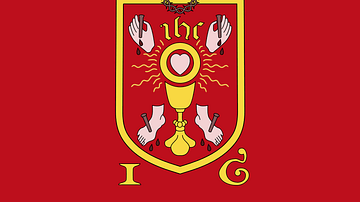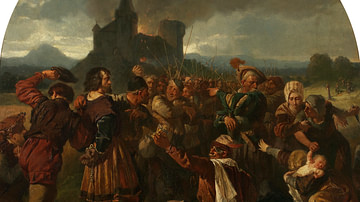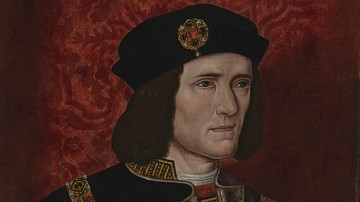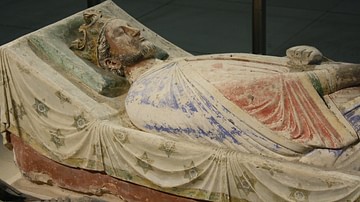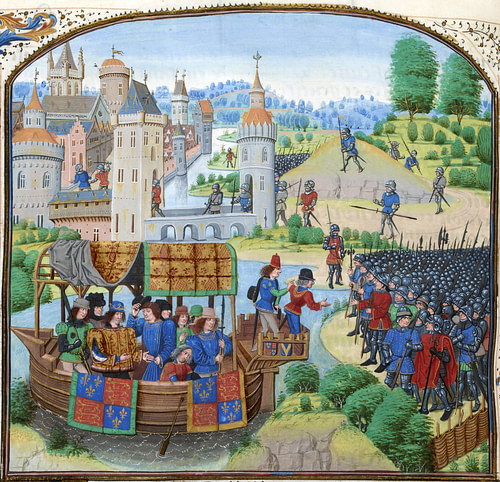
The Peasants' Revolt, also known as the Great Revolt, was a largely unsuccessful popular uprising in England in June 1381. The rebellion's leaders included Wat Tyler and they wanted massive social changes which included a removal of the poll tax, an end to the cap on labour wages, redistribution of the Church's wealth and the total abolition of serfdom.
The revolt began in the south-east of England and then spread to London and elsewhere. Although desiring social change, the rebels did not want to remove King Richard II of England (r. 1377-1399). It lasted only four weeks and was put down by Richard, first by negotiation and then through ruthless persecution of the ringleaders. The consequences of the revolt were, therefore, limited, but the poll tax was abandoned, restrictions on labour wages were not strictly enforced, and peasants continued the trend of buying their freedom from serfdom and becoming independent farmers.
Causes of the Revolt
The Peasant's Revolt of June 1381 was the most infamous popular uprising of the Middle Ages and it was caused by a simmering discontent in England that went as far back as the middle of Edward III of England's reign as king (1327-1377) and the arrival of the Black Death plague in 1348. It was, though, Edward's successor, Richard II of England, who had to deal with the chaos when the widespread discontent boiled over into all-out rebellion.
The principal causes of the Peasants' Revolt were:
- a new poll tax imposed on all peasants irrespective of wealth (the third such tax since 1377).
- the limit by law on wages after labour costs had risen dramatically following the Black Death plague.
- unscrupulous landlords trying to turn free labourers back into serfs (aka villeins) to save money on wages.
- a general feeling of exploitation by local authorities during a time of economic decline.
The poll tax of three groats (equivalent to a couple of days labour), was applied to anyone aged over 15 years (only beggars were exempt) and, unlike other taxes, it took no consideration of a person's ability to pay it. Just to add more woe, this third poll tax was three times higher than the two previous ones. The peasantry had been well-used to taxes, Edward III had imposed 27 of them during his reign, largely in order to pay for his hugely expensive military campaigns against the French during the Hundred Years' War (1337-1453). Richard similarly needed cash to carry on the war with France whose pirate ships were rampant in the English Channel, but now people had finally had enough. There were other problems, too.
The cost of labour had risen dramatically following a shortage of it after the Black Death struck in 1348, and this meant many serfs could now charge for their labour. Edward III had imposed laws restricting how much a labourer could earn each day, and there were strict punishments for those who did not comply. Many landlords attempted to get around the problem by making their labourers become serfs again, thus saving on their wages. The idea that one was not necessarily born into a life of servitude to another was a difficult one to quash, though, and people were well aware that large landowners, lawyers, and officials were conspiring in a system that kept the poor in their place while they themselves benefitted. There even spread a rhyme which expressed the commoner's discontent at not being treated equally as landowners:
When Adam delved, and Eve span,
Who was then the gentleman?
Christian beliefs were thus used to support the idea that all men were equal, or at least deserved to be treated with respect. Conversely, the medieval Church as an institution was also held responsible for many of the ills of society. Many commoners felt that church officials and institutions, especially the great abbeys, had not been very accommodating when the Black Death struck and were just as rapacious in extracting their duties and tithes as any other type of landowner.
The Black Death had killed between 30 and 50% of the population in areas it had struck, which meant that some peasants had been able to buy their own small piece of land to farm as land prices plummeted and there were not enough people to work it. These landed peasants were called yeomen. In addition, the drastic fall in population had hit small businesses and artisans as their customers evaporated. These developments may explain why it was in the better-off areas of the kingdom where the revolt broke out - East Anglia and Kent - and why it was a phenomenon not limited to the countryside.
Violence Erupts
The uprising began, then, in May-June 1381 in England's south-east where royal tax inspectors were investigating why tax returns had been surprisingly low. These inspectors suddenly met with opposition for their demands for payment of the poll tax which Parliament had passed in November 1380. Officials and sheriffs were kidnapped and murdered. Bands of rebels toured the countryside on horseback, torching manors and destroying their records - a clear indicator of the peasants' desire to overturn manorialism. The public records at Maidstone, Rochester, and Canterbury all went up in flames. The ringleaders seemed to be better-off small farmers and included in their number parish priests and village constables. This was not a revolt of the absolute poor but those commoners who had something to lose. The Crown sent men-at-arms to deal with the problem areas, but these were too few in number and many were killed.
Two leaders, in particular, came to the fore. Wat Tyler of Maidstone, perhaps a former soldier but any certain details are lacking, and the demagogue priest John Ball, who radically sought for more equality in society. Ball had already seen the inside of a prison a few times for his extreme preaching. The medieval chronicler Jean Froissart, (c. 1337 – c. 1405) records that Ball noted with frustration that:
[The lords] are clad in velvet and camlet lined with squirrel and ermine, while we go dressed in coarse cloth. They have the wines, the spices, and the good bread: we have the rye, the husks, and the straw, and we drink water. They have shelter and ease in their fine manors, and we have hardship and toil, the wind and the rain in the fields. And from us must come, from our labour, the things which keep them in luxury.
(quoted in Gies, 198)
Consequently, with leadership, genuine grievances and an ideological framework to justify their actions, the disturbances developed into a full-scale rebellion with a mission: confront the King and get things changed. It is important to note, however, that the rebels did not want to topple the king and their members even swore an oath of loyalty to 'King Richard and the true Commons'. The rebels marched to London on 11 June - causing much havoc on their way - where they were joined by equally discontented townsfolk illustrating that the revolt was not simply one of feudal labourers. In London, there had long been rivalries between the rich and poor, factions of the Church, medieval guilds, native and foreign merchants, and apprentices and their masters, and all these divisions would be widened by the revolt. Some chroniclers noted the rebels now numbered over 60,000 people, and all this while the king's army was in Scotland.
The Peasants' Demands
When the mob got to London on 13 June they continued to loot, pillage, and murder. Lawyers, foreigners, and petty officials of the Crown were just some of the groups targeted as old grudges resulted in wanton acts of vengeance. Prisoners were freed while those thought to be guilty of crimes were hanged by peoples' courts. A mob burnt down the Savoy palace and murdered anyone they pleased.
Although only 14, King Richard emerged from the safety of the Tower of London and bravely promised to meet the protest leaders at Mile End, a field on the outskirts of London. There Richard listened to their demands and blithely promised to meet all of them, issue charters accordingly and even permitted Tyler to extract justice on any person he thought deserved punishment. Tyler then promptly ordered the storming of the Tower of London and had the hated Chancellor, Archbishop Simon of Sudbury, decapitated on Tower Hill. Another day of looting, murder, and mayhem followed in the capital. Meanwhile, news reached the king that rioting had spread as far north as York and there was, or would be, trouble in the counties of Cambridgeshire, Herefordshire, Suffolk and Norfolk.
To put an end to the chaos Richard once more called to meet the rebel leaders, this time at Smithfield outside London on 15 June to hear their grievances again. He also ensured troops were put on standby in case of a battle.
The participants of the Peasants' Revolt demanded the following changes:
- the total abolition of serfdom
- a repeal of labour laws limiting wage increases brought in after the Black Death
- free fishing and hunting rights for all
- more peasant participation in local government
- the Crown should be the only authority in the counties, not local lords
- the redistribution of the Church's riches, especially of the great abbeys
These demands were frankly ludicrous for the period but they did at least have some basis in reality. Serfdom had already been eradicated almost everywhere, but there were some pockets of the country where the practice still went on. Similarly, the redistribution of Church wealth was an idea championed by the theologian John Wycliffe (c. 1325-1384), one of the leaders of the movement whose followers became known as 'Lollards'. The movement of 'Lollardy', perhaps deriving its name from the Latin word for 'prayer' (or the derogatory Dutch word for 'mumble'), emphasised that anyone could pray in private, an idea which threatened the monopoly of the Church and its appointees as the bridge between humanity and God. Wycliffe even wanted people to be able to read the Bible for themselves, and so he made a translation from Latin into English, but he was prohibited from publishing his work in England.
Richard's successor, Henry IV of England (r. 1399-1413) was anxious to preserve the status quo and persecuted the Lollards until the movement all but disappeared. Nevertheless, there remained a strong anti-clerical feeling amongst the Peasants' Revolt protesters as the Church was seen not only as grasping but as the provider of funds to the Pope, a foreigner who supported the great enemy France. Finally, there was some truth in the idea that local lords were extracting more than they should from their estates, and there was a feeling that the king was being misled and badly served by certain officials such as the Chancellor and dukes like John of Gaunt, Duke of Lancaster (1340-1399).
At Smithfield, after the demands were presented, things could have taken a very ugly turn when William Walworth, the Mayor of London stepped forward and killed Wat Tyler, perhaps thinking Tyler was about to do the king harm. Tyler had, in any case, been disrespectful to the king by spitting water at his feet. As the crowd surged forward, Richard stepped amongst them and boldly declared:
Sirs, would you kill your king? I am your rightful captain, and I will be your leader. Let all those who love me, follow me.
(Quoted in Jones, N., 75)
Richard then employed the much-used tactic of making a load of extravagant promises he had no intention of keeping such as giving everyone involved royal pardons. These promises were enough to stave off more rioting, and the mob disbanded, escorted out of London by the city's militia.
Consequences of the Revolt
Utterly ruthless, Richard next ensured that around 150 of the rebels were hanged, so many that new gibbets had to be built for the purpose. Wat Tyler's head was displayed on London Bridge. There were other minor outbreaks of rebellion thereafter, but these were mercilessly quashed and their ringleaders executed as traitors. As the king boldly stated: 'villeins ye are, and villeins ye shall remain'. The whole affair was perhaps the high point of Richard's reign as things went downhill from then on, the once-admired young king turning out to be a major disappointment and ending his days with a short imprisonment and a mysterious death.
Ultimately, though, there were social changes in England, as had already be seen prior to the revolt. The poll tax was abandoned, the limits on labourers' wages were not rigorously enforced, and serfs continued to buy their freedom. Significantly, the law and legal records were now used not by landowners to enforce an obligation of labour but to demonstrate a labourer had legitimately bought their freedom and could pass on their land to their descendants.
